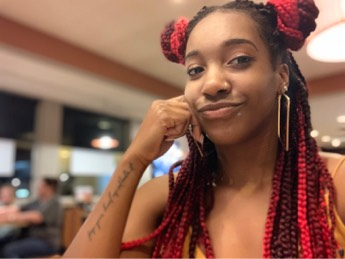
In my first year at Stevenson, some people that I’ve come to like and appreciate have left and things have shifted. I had to start over in the process of getting to know other people . . . and that is a nerve-racking task, especially if you’re not as outgoing of a person as I am. But I think the shift in leadership at the Greenspring Review is exciting. Our new editor-in-chief Jordan Mitchell is new and fresh with ideas. I recently had the pleasure to sit down and talk with her.
*For clarity purposes, the following conversation has been slightly edited.
Josie Hunter: Introduce yourself: Name, major, minor, fun fact about yourself.
Jordan Mitchell: My name is Jordan Mitchell. I am a double major in English and Psychology. Fun fact about myself: I’m a student athlete. I run track. I’ve been running track since I was six.
JH: Cool, cool. When were you appointed GSR editor-in-chief?
JM: I was asked [to fill] the position last semester— so sophomore year, spring semester 2019. But I just assumed duties this semester.
JH: What was that process like?
JM: [It was] a little confusing because Audrey [last year’s editor-in-chief] had run the GSR for an internship so she did majority of the work by herself, but when it was transferred to me it’s not an internship so I had to establish a hierarchy.
JH: Interesting.
JM: Yes, I had to find people so I wouldn’t do everything by myself. So that’s been a little slow–an ongoing process of figuring out quite who to talk to and who has to do what and what everyone’s duties are, but we’re working it out, so. . .
JH: Cool. I didn’t know she was doing it as an internship. She did say she was doing a lot of the work, but I didn’t know the internship part of it. That’s interesting. So, how were you previously involved with GSR?
JM: I was always involved. Basically, just talking about it with her. We would talk about submissions and these things people could submit. I wasn’t actually on the staff or anything. I was more so like the behind-the-scenes English major like most of us generally are. We always talk about things. So that was it. . .
JH: Okay and by her, do you mean [Professor] Nyland?
JM: Um yes, Nyland is the one who offered it to me at the English Showcase. And up until that point, I was the secretary but then she offered editor-in-chief and I took the position.
JH: Oh okay. Cool. What new ideas or changes do you want to implement as the new editor-in-chief of GSR?
JM: Other than the boring things like submission guidelines and stuff, I was interested in discussing with a couple of the other GSR staff how we can get things like spoken word involved into the magazine. And instead of doing spoken word since it’s usually vocal— you’re supposed to hear it— instead of having them write down their spoken word, we were going to have people record it since we do media editing anyway. Media content like that of less than three-minute clips of spoken word.
JH: That’s a good idea.
JM: It’s a way of expression. So really, it’s just about getting the word out about that and in front of the right people who would want to do that. I’m not entirely sure we would have it done by this semester since it’s such a new idea and it’s going to take a little time. But by spring semester, it’s my goal to have spoken word media.
JH: That’s cool. Yeah, we don’t get a lot of media submissions and if it is, it’s usually photography. So, like the collages from the writers’ workshop was really nice and really cool. It’d be nice if people knew that mixed media and anything art-related [could be submitted].
JM: Yeah, I’m interested in bringing in other majors. I know a majority of the time— it’s not always English majors— but majority of the time people think [they] have to write poetry, stories, or things [like that]. We have a lot of art majors, and design and theater people here and just opening up the Greenspring Review to them and showing them that they can do [those] things, too . . . like everyone doesn’t have to be a writer.
JH: It might just be the “literary” part. Like literary doesn’t just mean writing. It could basically be—
JM: Anything that has to do with the human experience as Nyland says. I think it’s just more so about— I don’t want to say that I’m trying to rebrand the Greenspring Review, I’m just trying to broaden what people think when they hear literary magazine— just trying to change what they think when they hear that.
JH: I like that. That’s good. People don’t even know about creative nonfiction.
JM: Right. Like it doesn’t have to be about a story about ghosts and things. It could be about your life and all kinds of stuff.
JH: Yeah just put it in an interesting way. Yeah, yeah. . . That’s good. What are your career goals?
JM: ‘Kay. So, I want be a secondary English teacher in underserved communities. So I’m interested in— which is why I’m [double-majoring in Psychology]— how cross-culturally races learn differently. And how basically the standard teaching style is geared towards more the Caucasian standpoint, leaning-teaching atmosphere. So, I’m interested in cross-cultural education and how the difference is and how we educate students of color and non-students of color. I want work in DC public schools because they’re really interested right now in the underserved view which is generally people of color in DC. So, I want to work there and on the side, I want to do creative writing.
JH: That’s good, that’s good. That’s cool. Are you from DC?
JM: No but my mom is. I’m from [the] PG County area, which is a little bit close to DC, but not like DC.
JH: I’m from Waldorf, so people say I’m from Africa. [People really do joke about how far away Waldorf is]
JM: I live there now, so I understand. I understand.
JH: Oh okay. I live literally on the edge of Charles County, we’re bordering PG.
JM: That’s what I always tell people. PG [her hand perpendicular to the table, becoming a border] PG.
JH: Exactly like I go to church and the grocery store in PG County.
JM: Same. But yeah, I’m not from DC but I’m interested in working there because of the advances they’re making in underserved education.
JH: When you said cross-cultural learning, it was interesting because at the [English] Showcase— I don’t know if you remember [she nodded] but I came to your presentation about The Chi and Shameless which I thought was interesting considering they both take place in Chicago but— how you were saying— they portray different things. That makes sense.
JM: Yeah, I’m definitely into everything cross-cultural because there’s like different types of ways to look at things: economically, gender, sexuality, but I’m always on the cross-cultural side so that’s where my specialty is. So yeah.
JH: Where do you think that interest comes from?
JM: I was homeschooled my whole life. This is like my first time in an actual institution so I was homeschooled in a PWI [for those that don’t know, that’s a Predominantly White Institution] environment and a lot of my teachers were— it was a healthy black and white— but we were really segregated like whites over there, black people over here. And it wasn’t like we didn’t like each other, it’s just like that’s how it ended up being and everyone was okay with it. It was just the way that they— I watched us all learn certain things and the way the black students got left behind. It’s like not intentionally, but it’s just because we just weren’t getting it. And I had to— I’m a very visual learner, but I know sometimes teachers will just say things and everyone’s like, “Oh I just got to write this down,” and I’m like “. . . No.” So that’s when I first became interested in different learning styles, not cross-culturally, but just learning styles in general. I got interested in that and once I got here— more so my transition here— but I just realized that at first I wanted to teach in the private schools up north like Connecticut-type areas because they have really good private schools so I’m like “Ooo a literature teacher, like that would be really cool if I taught [that] up there.” But then I started thinking about how if every good teacher goes to a PWI to teach, we’re never going to help our own communities. And we can’t keep saying, “Oh our community is so far behind,” and not actually help. So that’s when I became interested in stuff like why do black students do worse on standardized testing? Why do we do certain things like this? So then once I learned that’s there’s actually fundamental differences in education based on culture, I was like “Well why don’t we talk about this more?” So, then I got more interested into it, deeper in it, I started looking at schools that are interested in cross cultural education. [I] started looking at programs that work with the underserved communities and now . . . I’m here.
JH: That’s interesting.
JM: Yeah, it’s been a journey.
JH: Have you done or have any internships lined up?
JM: No. Two summers I worked at an underserved summer camp. It was rough, but my first summer I was a teacher’s aide. So basically, I didn’t really do much. You basically just do whatever the teacher tells you to do, you do. Recently— last summer— I was promoted to a teacher’s assistant, so I actually ran the summer camp portion for the morning time until the head teacher got there. So, I was in an actual teaching position and it wasn’t with the age group I wanted do. I don’t want to work with middle school and under, I want to work with high school. But it was all middle school and under so bless their hearts. That’s the only experience I really have— I mean that was a lot of experience— but that was the only experience I had with children, but I’m planning my internship for next year because I have to get a car first. I’m trying to over the summer to either start working in DC-areas or interning in not even just education but in juvenile provisional services. They have internships there, so crossing my fingers.
JH: Cool.
JM: I have to do more research into DC programs. I know there’s a lot you have to go through. There’s like the funded ones, nonprofit ones, the government ones, the private ones and I just have to get through it all. I’ll probably start looking spring semester. I’m taking a lot of heavy psychology courses this semester— like heavy— so I’m not trying stress myself out for no reason.
JH: You mentioned creative writing on the side. You said you like to write fiction? What do you typically write?
JM: Me and Professor Nyland discussed the difference between sci-fi and fantasy. So . . . I’m more so on the fantasy side? Sometimes it might cross into science fiction, but I try not to let that happen because science fiction— in my opinion— is more complicated because you have to go through the explaining and science of things while in fantasy things are just happening. You don’t have to explain it. So, I’m mainly interested in writing YA fantasy. Kind of dark fantasy— I like dark fantasy. But I can go back and forth because I write fantasy, but sometimes I write romance in general. I can write light-hearted, but sometimes I write dark. I think my favorite is probably dark fantasy because I like darker novels, so I’ll probably lean [more] towards fantasy in general.
JH: Cool. Will you be submitting to the Greenspring Review?
JM: That’s funny because I keep telling myself, “you need to start writing” but then I feel like I’m doing so much other stuff trying get the Greenspring Review together that I’m like, “Haha will I have time?” I probably will submit something. I can’t say what. I’m working on a project right now, but it’s more so— I’m writing a book. So, it’s going be way too long for the Greenspring Review, but I’m thinking about taking out a little snippet and make it like a flash fiction-type short story.
Welcome this year’s new Greenspring Review Editor-in-Chief, Jordan Mitchell!





